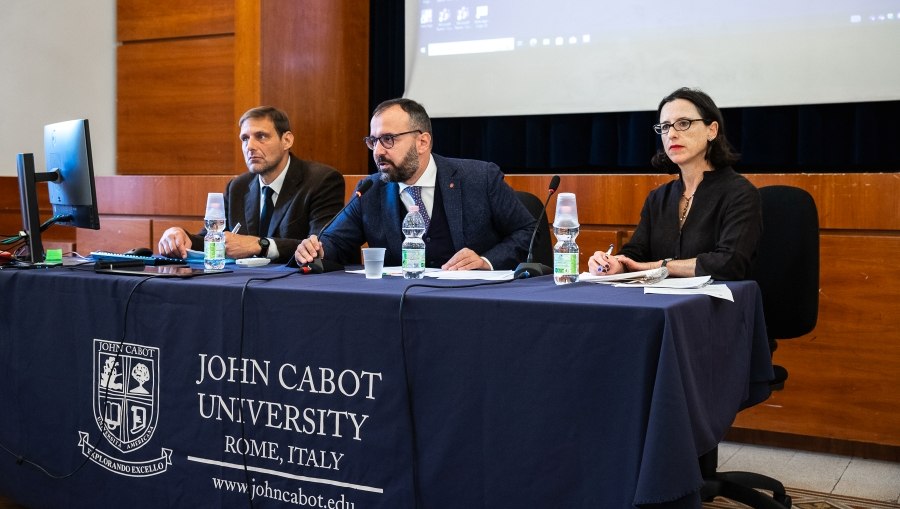Reading Tonight with JCU Poet in Residence Billy Collins
According to former Poet Laureate Billy Collins, just as international education fosters cross cultural understanding, poetry also brings people together under the common heading of our humanity.
“The way I feel about poetry is forming bridges to other cultures and therefore other peoples and therefore other governments. Poetry reminds us that we are all the same in essential ways even though warring regimes and nationalistic fanaticism insist that we are all different. The more poetry that can cross borders, the more people on both sides are reminded of how much we all have in common and our temporary differences can be forgotten in view of how little the political differences matter in the end. Poetry reminds us of our mortality, natural beauty and other common properties that we all share. Poetry brings us down to a theme of just being alive. Life is beautiful but we are all going to die; poetry makes us aware of our mortality and makes it more vivid. This is common to all poetries and cultures.” — Billy Collins
Thursday, 7 June, 8:30 p.m. La Sala Grande in San Lorenzo in Miranda, beside the Roman Forum Via di Miranda 10.
Reception to follow.
To reserve up to two tickets to this event, click here.
Photo ID is required to enter.
Event will begin at the indicated time.
Guests will not be allowed to enter after the event has begun.
———————————————————–
Billy Collins, United States Poet Laureate 2001-2003, is an American phenomenon. No poet since Robert Frost has managed to combine high critical acclaim with such broad popular appeal. His work has appeared in a variety of periodicals including The New Yorker, The Paris Review, and The American Scholar; he is a Guggenheim fellow and a New York Public Library “Literary Lion.” His last three collections of poems have broken sales records for poetry. His readings are usually standing room only, and his audience – enhanced tremendously by his appearances on National Public Radio – includes people of all backgrounds and age groups. The poems themselves best explain this phenomenon. The typical Collins poem opens on a clear and hospitable note but soon takes an unexpected turn; poems that begin in irony may end in a moment of lyric surprise. No wonder Collins sees his poetry as “a form of travel writing” and considers humor “a door into the serious.” It is a door that many thousands of readers have opened with amazement and delight.
Billy Collins has published nine collections of poetry: Questions About Angels, The Art of Drowning, Picnic, Lightning, Taking Off Emily Dickinson’s Clothes, Sailing Alone Around the Room: New & Selected Poems, Nine Horses, The Trouble With Poetry and Other Poems, and Ballistics. A collection of his haiku, titled She Was Just Seventeen, was published by Modern Haiku Press in fall 2006. He also edited two anthologies of contemporary poetry: Poetry 180: A Turning Back to Poetry and 180 More: Extraordinary Poems for Everyday, was the guest editor of The Best American Poetry 2006, and edited Bright Wings: An Illustrated Anthology of Poems about Birds, with paintings by David Allen Sibley. His newest book, a collection of poems entitled Horoscopes for the Dead, will be published in spring 2011.
Included among the honors Billy Collins has received are fellowships from the New York Foundation for the Arts, the National Endowment for the Arts, and the Guggenheim Foundation. He has also been awarded the Oscar Blumenthal Prize, the Bess Hokin Prize, the Frederick Bock Prize, and the Levinson Prize — all awarded by Poetry magazine. In October 2004, Collins was selected as the inaugural recipient of the Poetry Foundation’s Mark Twain Award for Humor in Poetry.
In June 2001, Billy Collins was appointed United States Poet Laureate 2001-2003. In January 2004, he was named New York State Poet Laureate 2004-06. Billy Collins is a Distinguished Professor of English at Lehman College of the City University of New York, as well as a Senior Distinguished Fellow of the Winter Park Institute at Rollins College.
“Luring his readers into the poem with humor, Mr. Collins leads them unwittingly into deeper, more serious places, a kind of journey from the familiar to quirky to unexpected territory, sometimes tender, often profound.” — The New York Times





